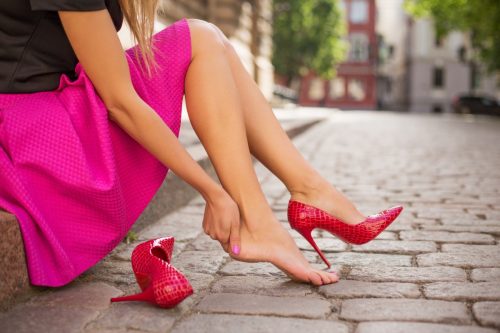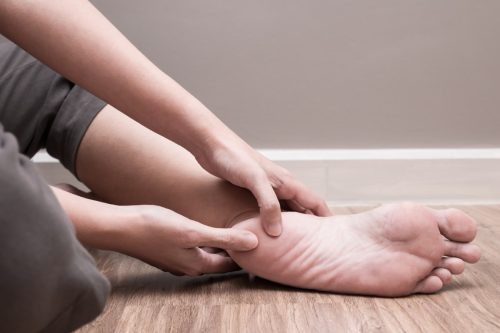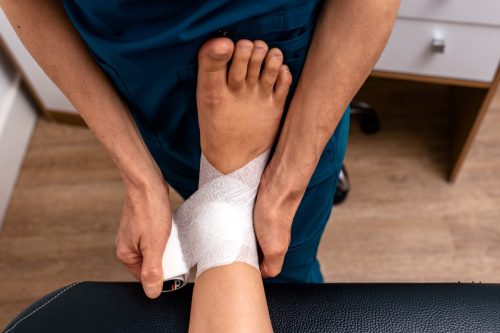What Happens If You Wear High Heels Every Day, According to Doctors
Spoiler alert: Your feet, knees, and back will suffer.

A pair of sleek stilettos or sky-high platform pumps can undoubtedly make you walk a little taller and feel a little more confident—not to mention kick any ensemble up a notch. But what happens if you wear high heels every day?
The problem with heels, experts say, is that they disrupt the natural form of your body. By putting your feet at an exaggerated angle, they pull your muscles and joints out of alignment, which can lead to a lot of concerning symptoms and conditions over time. According to Shoaib Malik, MD, a board-certified family physician at Prime Health of New Jersey, wearing high heels causes harm not only to your feet, but also your ankles, calves, knees, and back.
They say "beauty is pain," but doctors unanimously agree that no footwear, no matter how stylish, is worth the discomfort, pain, and potential for deformity and injury that regular heel-wearing can cause. For these reasons, doctors recommend limiting how much time you spend in high heels.
"To minimize the negative effects of wearing high heels every day, it's important to choose lower heels with good support," Malik tells Best Life. "Wearing orthotic inserts or arch supports can help distribute weight more evenly and reduce pressure on your feet. Taking regular breaks from wearing high heels and stretching your feet and legs can also help alleviate any discomfort."
Nelya Lobkova DPM, a board-certified podiatrist in private practice, also recommends looking for chunkier block heels with an ankle strap to provide extra stability.
With all that in mind, read on to find out what consequences you might experience if you wear high heels every day.
READ THIS NEXT: What Happens If You Don't Wash Your Hair for a Week, According to Doctors.
Your back might ache.

The plantar fascia, a band of tissue that runs from your heel bone to the base of your toes, is also connected to the calf muscle. The calf muscle connects to the hamstring, which attaches to the low back and pelvis. So don't be surprised if you find your back aching after wearing high heels frequently.
High heels also force you to walk on the balls of your feet, which moves your center of gravity forward. "This means wearing high heels can alter your posture, causing your lower back to arch and potentially leading to back pain," adds Malik. "This is because the weight of your body is shifted forward, placing more pressure on your lower back."
READ THIS NEXT: If You Notice This on Your Feet, Get Checked for Parkinson's.
Your feet might hurt.

Research from 2015 linked wearing high heels with increased rates of musculoskeletal pain. This should come as no surprise: If you've ever worn heels for an extended period of time, you're likely familiar with the dreaded throbbing or aching sensation in your feet at the end of the day or night. So, why does this happen?
"Since high heels cause your body to shift forward, that leads to increased pressure on your toes and feet," Malik explains. Since the weight of your body may be concentrated in the balls of your feet, Malik says it's not uncommon to experience pain in that particular area. "This can lead to conditions like metatarsalgia, which is characterized by pain and inflammation in the ball of the foot," he tells Best Life.
According to Lobkova, wearing high heels too often can also cause Morton's neuroma, a painful condition that occurs when the nerve between the toe bones becomes inflamed. This condition can involve a sharp, burning pain, or numbness and a pins-and-needles sensation in the toes or ball of the foot.
You may develop plantar fasciitis.

Wearing high heels can shorten the calf muscles—and more specifically, the Achilles tendon, Lobkova says. "Shortening this tendon can lead to micro-tearing, which can then contribute to the development of tendonitis and plantar fasciitis."
Plantar fasciitis, which occurs when the thick band of tissue supporting your arch becomes inflamed, can cause stabbing pain, swelling, and tenderness near the heel. In extreme cases, this condition can even make it difficult to walk.
Malik points out that when your calf muscles shorten, you may also find that walking in flat shoes is too uncomfortable.
For more health news sent directly to your inbox, sign up for our daily newsletter.
You could be more prone to injuries.

One 2012 study found that teachers who wore high heels to work were 1.6 times more likely to get a repetitive strain injury than those who didn't.
Nathan Fisher, DC, a chiropractor at Achieve Health and Wellness, notes that you may be at a higher risk of falling when you wear high heels, because you have less stability while walking.
And that's not all. Even if you don't teeter and topple over in heels, there's still a chance that your footwear could cause an injury. In fact, a 2007 study published in the journal Ergonomics revealed that older adults who regularly wear high heels are more likely to fall—even if they are not wearing heels at the time of the incident.
"When you wear high heels, the natural fat pad in the ball of the foot is displaced towards the toes, minimizing the shock absorption where it is needed most—directly under the ball of the foot," Lobkova explains. "This decrease in padding directly under the bony ball of the foot can cause stress fractures and ligament injuries in the foot, or nerve impingement."
According to a 2015 study, the vast majority of these high-heel-induced injuries (more than 80 percent) involve the ankle or foot. More than half of these injuries are strains or sprains, and 20 percent are fractures.
You may experience foot deformities.

A 2019 study, which compared the feet of women who wear heels to work every day to women who wear flats, found that high-heel wearers are more likely to have a number of deformities, including bunions and an overlapping fifth toe. Researchers noted that wearing high-heeled shoes limits ankle mobility and overloads the forefoot, among other issues that lead to these deformities.
According to Lobkova, wearing high heels every day can also increase your risk of developing "hammer toes." Hammer toe —a deformity of the second, third, or fourth toe—describes an abnormal bend in the middle joint of the toe. It can cause pain in the affected toe, and make it difficult to move.
"In addition, high heels usually cause crowding of the toes in the toe box, which further exacerbates the hammer toe deformity," Lobkova says.





















